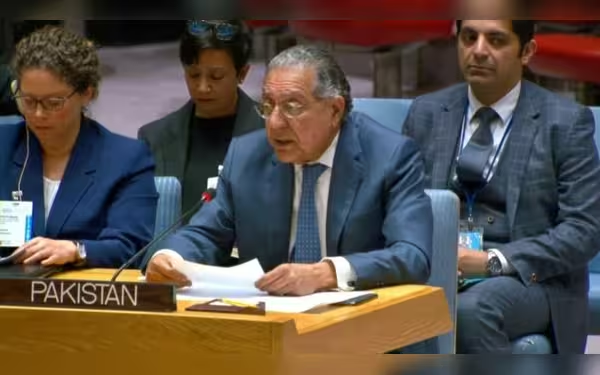Saturday, November 16, 2024 07:57 PM
Pakistan Envoy Criticizes Afghan Government for Supporting Extremist Groups
- Pakistan urges Afghan government to combat extremist factions.
- Munir Akram highlights cross-border security threats.
- International cooperation is essential for regional stability.
 Image Credits: thenews.com.pk
Image Credits: thenews.com.pkPakistan's envoy Munir Akram criticizes the Afghan government for supporting extremist groups threatening regional security.
In recent discussions at the United Nations Security Council (UNSC), Pakistan's Permanent Representative, Munir Akram, raised serious concerns regarding the actions of the interim Afghan government. He specifically pointed out that this administration has been supporting groups known as "Fitna al-Khawarij." This term refers to extremist factions that have been involved in violent activities, including cross-border attacks into Pakistan.
Pakistan has repeatedly urged the Afghan authorities to take action against these militant organizations. The concern is not just about security; it is about the safety and well-being of the people living in both countries. The ongoing violence and instability in Afghanistan have a direct impact on Pakistan, leading to fears of increased terrorism and unrest.
Munir Akram emphasized that the Afghan government must ensure that its territory is not used as a base for launching attacks against Pakistan. This call for action is crucial, as the relationship between the two neighboring countries has been strained due to these security issues. The Pakistani government believes that a stable Afghanistan is essential for regional peace and security.
As the situation unfolds, it is vital for the international community to pay attention to these developments. The actions of the Afghan government will not only affect Pakistan but could also have broader implications for the entire region. Cooperation and dialogue are necessary to address these challenges effectively.
The call from Pakistan's envoy highlights a pressing issue that requires immediate attention. The fight against extremism is a shared responsibility, and it is crucial for all nations involved to work together to ensure a peaceful and secure future for their citizens. Only through collaboration can we hope to overcome the challenges posed by groups like "Fitna al-Khawarij" and foster a climate of stability in South Asia.













